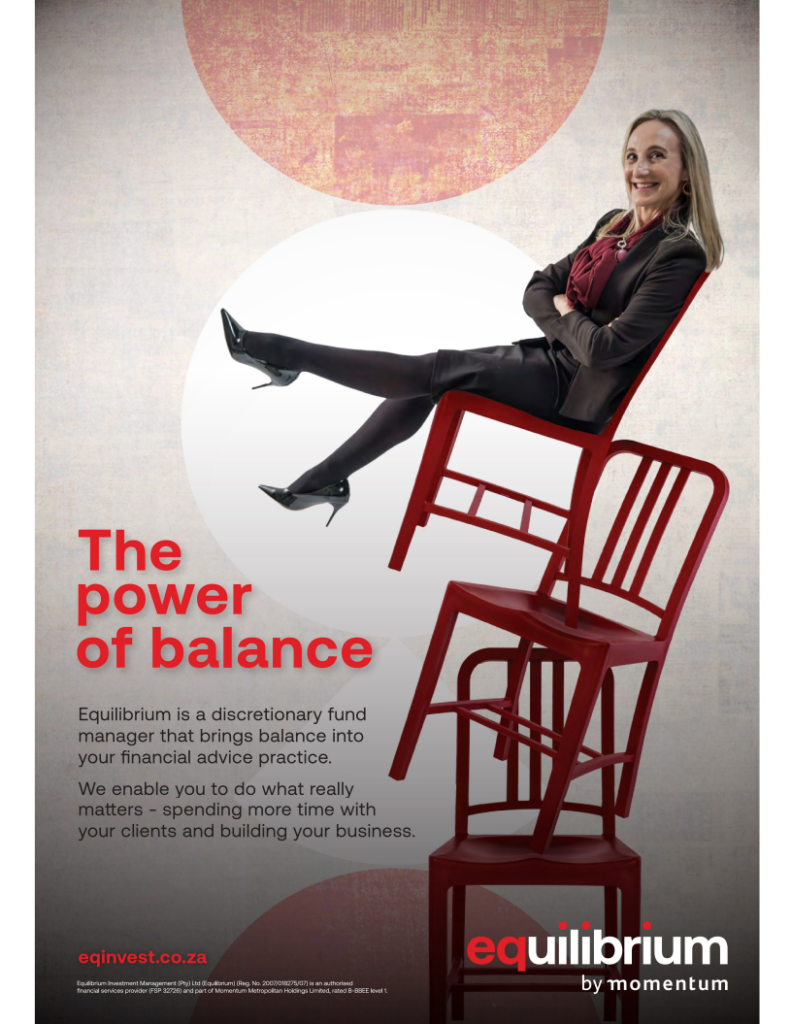Florbela Yates, Head of Equilibrium

Advisers are continuously partnering with discretionary fund managers (DFM) for a variety of reasons. The main reason cited by advisers being the lack of time. South Africa has one of the most regulated investment industries, which means advisers are spending more time on compliance and less on doing what matters most – giving advice and spending time with their clients. By recognising that their value rests in evaluating clients’ personal circumstances and determining their unique needs, advisers are increasingly partnering with investment experts to ensure that their clients’ investment needs are consistently met. The partnership with a DFM not only saves the adviser an enormous amount of time but also ensures that all the investment considerations are met.
At Equilibrium, our range of services includes strategic and tactical asset allocation, strategy optimisation, risk management, manager research, fund and mandate design, portfolio optimisation, as well as consolidated reporting. We take care of everything to do with investments for our adviser partners. By using our consolidated monthly factsheets and quarterly investment reports advisers can speak with conviction about the performance and expected returns from the various portfolios. Essentially, we become an extension of their advice practice.
Advisers often cite the fact that we save them time as one of the key advantages of using a DFM. This is because we essentially become their personal investment team – taking on all the investment functions, from constructing portfolios, getting them loaded on their preferred platforms, managing both, the rebalancing and compliance, as well as running the investment committees. The industry has a huge shortage of Key Individuals (KIs), and this is one of the biggest challenges that the regulator is facing with the proposed licensing requirements under the Retail Distribution Review (RDR). To have full oversight, KIs cannot be “rented” out. They need to have sufficient time to ensure that they really can provide oversight. Therefore, the days of a KI on multiple licenses will soon be over.
At Equilibrium, we are delighted to be able to contribute to the industry as a whole by offering supervision for other Category II businesses who want to get their own licenses. Does this mean we are growing competitors? Yes, it does. But in our experience, these Category II advisers do not always have the full set of capabilities necessary to cater for their client needs. They benefit from being able to use their own Category II license to create certain efficiencies (for example moving from model portfolios to funds, or fund of funds, to specifically address their CGT issues) and other investment needs.
One of the most pleasing trends that we have seen, is how our clients have remained invested and have not de-risked despite the volatility in markets. But still, a concern is that advisers in general are using too many LISP platforms. Partnering with a DFM may simplify their practices to a certain extent, but unless they consolidate the number of platforms on which they load their solutions, they will battle to harness the benefits that come from partnerships. The two key issues being advisers’ ability to access better platform pricing and to ensure that the platforms they use to deliver on their client’s objectives.
As an independent DFM, we are available on nine platforms – Glacier, Allan Gray, Momentum Wealth, Ninety One, Stanlib, INN8, Old Mutual, PPS and AIMS. There are others on our watch list, and we would
consider adding them provided they meet two main criteria: the first is our ability to execute effectively and the second is the demand for that platform from independent financial advisers.
But from an adviser perspective, it makes sense to partner with one or two platforms. Advisers are then in a position to negotiate better fees and limit the complexity that comes with different constructs and fee classes across platforms. We have recently seen another bout of consolidation across the adviser industry both locally and globally, especially in the UK. There is no doubt that advisers who use fewer platforms are getting higher multiples on the sale of their practices. I believe that using more than three platforms is a disadvantage. For advisers with smaller assets, it makes sense to limit to one or a maximum of two platforms.
As an adviser it is important that you truly buy into the right partnership that is going to be sustainable. Make sure that your partners have the tools available to help you keep your clients invested, and offer competitive pricing and the level of reporting that meets your needs.


